Colony Collapse Disorder
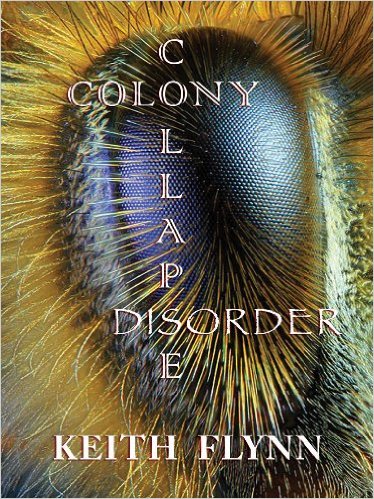
 by Keith Flynn,
by Keith Flynn,
Wings Press, 2013,
$16.00, 103 pages, paper,
ISBN: 978-1-60940-294-5.
Buy the Book
Keith Flynn is a direct heir of the Beats in that he questions surface realities, often harshly, yet also creates empathy within readers for human frailty. There’s nothing cheap or facile about his questions; they provoke the reader and disturb with musical phrasing and stark imagery, as in the following lines from “Easter in Palestine”:
On the face of it, the landscape bore
an astonishing nostalgia for lies.
The tapestries cried; the gates of Paradise
opened and shut like the jaws of a shark
in the frenzy of chum.
With an intuitive heart, Flynn takes us all over the world, back and forth in historical time, and uses as his pivotal metaphor the sickness and disappearance of almost half of American honeybees, and the death of bees rapidly spreading to other countries. Instability is a given, Keith Flynn’s poems tell us. Labadee, Haiti, “fat and warm,” a navel in the world, is changed during an earthquake “like a woman slowly dropping her slip from / one shoulder as she slides away.” Unwanted immigrants ride the bus in Berlin, men shoot at pillows and glass window panes even after the war ends in Kosovo, people wander Atlantic City, “where the prelapsarian middle class of all rotted / American Dreams comes to be fleeced / and calls it fun,” and in Dothan, Alabama, things are also not well. Here are a few lines from one of the strongest poems in the book, “Alabama Chrome,” about people whose only sin is “proximity to poverty.”
Handsome warlocks, strapped to strip
malls, and mauled by the perfection
drop poison pellets from their
raven beaks onto the lips of sun-streaked
Meth-pocked blondes in the windy
parking lots of ritualistic pawn shops
and close-cropped itchy trigger teeth
gritted in the Marine recruiting station,
whose volunteers choose grief over
nothing
An elastic, fluid language permeates each poem, often with staccato bursts like a trumpet solo pointed towards the stars. But Flynn takes a quieter mode in several of the poems; deeply reflective, willing to look long and hard for a hidden shaft of light, a clue from a fragmented history that will speak to him. In “Coffin Not Included,” he says “The walls / between this world and the next / are leaky as an old rowboat.” For “The Seven Islands of Izu,” short stanzas push forward like an oar through cold, ancient water. The tone of the poem is like gray brushstrokes on a scroll, and the reader can almost feel clouds above, or gusts of wind. And one of my favorite poems in this book is “God Gives Us Each a Song.” Here’s how it ends:
The worm’s tiny groan as it pops out
of the apple’s skin and finds itself
alone, filled with the right
of the Spirit to be known.
Not every poem in Colony Collapse Disorder rises to this brilliance. “Present at the Revolution” falls flat, the Parisian fashion designers in “The Resurrection of Haute Couture” seem superficial, and Andrew Jackson’s persona in “Old Hickory Gets the Bends” is ponderous. A little pruning would have helped, or perhaps two or three poems eliminated and others substituted, without affecting the book’s basic strength and structure. And truly, the book’s greatest strength is that raw voice that speaks so honestly to us, intimate as a low, hoarse train whistle late at night.
For me, Flynn asks the big questions. He can’t completely answer them — no one can. But he asks, How can I be whole as a man, on this damaged planet? And also, Why do people hurt each other so badly? In “The Exile,” a short, sweet poem, the narrator says “I’ve tried to rope the world in countless / ways and have
done the best I can, / with tangled prayers and no reprieve.” And if this echoes Richard Hugo, that also seems like a blessing: compassion for wounded souls, such as Hugo’s Mrs. Jensen, can never be learned or faked. Keith Flynn is like an EMS worker in the world of poetry: risking the deep places, and born to heal.
— Sharon Olinka
Look Back, Look Ahead: The Selected Poems of Srecko Kosovel
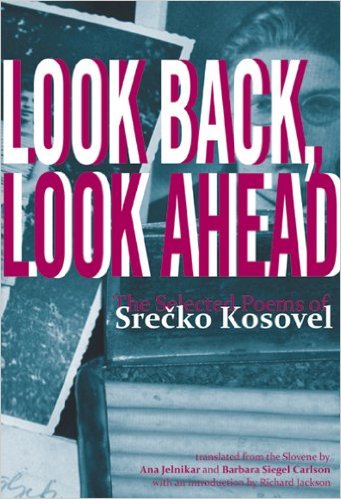
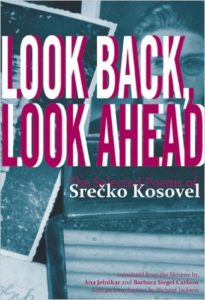 by Srecko Kosovel,
by Srecko Kosovel,
Translated from the Slovene by Ana Jelnikar and Barbara Seigel Carlson,
Ugly Duckling Presse, Brooklyn, NY, 2010,
220 pages, paper, $17.00,
ISBN: 978-1-933254-54-8.
Buy the Book
Most English speakers have probably not heard of Srecko Kosovel or hundreds of other poets who wrote in their native tongues, who spent their lives struggling to bring light and justice to a primarily imperialist world. It has been the work of translators to bring these voices into our hearing and our hearts, re-building them carefully and gently so that poets like Kosovel, a Slovenian, live for us again. As the translators say in their notes:
. . . we came around a dirt road to a high stone wall with a
fig tree on the other side whose high branches were laden
with fruit. One of us climbed the wall and, balancing just
so, reached up for a few plump figs and handed them down
to the other. So it has been translating Kosovel’s poetry: to
be given this sweet fruit born of what we can never wholly
recreate, and handing it down as best we can. (xxi)
While this is not the first collection of Kosovel’s poems, it builds on previous collections and offers previously unpublished poems by a young poet who wrote with a tenderness and ferocity beyond his years, as in “Who Cannot Speak”:
Who cannot speak
has no need to learn.
You look for a new word —
today it’s unclear
which word it is.
You must wade
through a sea of words
to arrive in yourself.
Then alone, forgetting all speech,
return to the world.
Speak as solitude speaks
with unutterable mystery.
Kosovel had published only some 40 poems at the time of his death, but he left approximately four thousand poems and fragments, more than a lifetime’s work for many poets. Kosovel died in 1926. He was 22 years old. Growing into his voice at a turbulent time in European history, he wrote in a wide range of styles: traditional pastoral poems that evoked his deep ties to his homeland, political poems that stoned the impenetrable walls of nationalism, experimental work that included mathematical symbols, unorthodox word placement, and other avant-garde experiments, while including stunningly lyrical moments. Here is the voice of a poet coming of age at an earth-shaking time. His work spins on a wheel of changing politics, social upheaval, new technologies, and alternative spiritualities. Kosovel gave voice to an age even as he stretched his work to include all these changes. His vision was local and global, personal and universal.
The work of Carlson and Jelnikar in bringing these poems to us feels like the recognition of poets for a lost friend’s work. They bring examples of Kosovel’s varied voices, yearning or strident, challenging or fearful. Their translator’s notes help us understand the extreme attention demanded by the work of carrying the complexities of sound, rhythm, and underlying levels of meaning of a poem while attempting to be true to the voices of both languages and the poet. Poems are chosen to represent the whole body of his work, not merely the comfortable. The introduction, by Richard Jackson, and the afterword, by Ana Jelnikar, give us windows into Kosovel’s life and times and provide us with some historical context for his writing. A contemporary of James Joyce, who was living in Trieste as the young poet was lighting the torches of his poems, and Rilke, who was writing his elegies nearby in the castle at Duino, Srecko Kosovel has been called “the greatest Slovenian poet of the twentieth century” by Tomaz Saluman. It is only the work of dedicated and sensitive translators that allows us to hear him. They deserve great thanks.
Often the task of a reviewer is to make judgments based on his or her personal response to a poet’s work. In this case, I can only say that I feel fortunate to have spent some time with the translators in Slovenia a few years ago and the beauty of the place is deeply haunting. Through these poems I will return there again and again:
One Word
I wish I could say one word
just like the spring wind
softly enters your heart.
I wish I could say one word.
But look, I have nothing else,
my heart is an altar cracked in half.
My words are like wounds,
each one of them bleeds.
Dreams don’t vault into this dark,
only black walls’ rough edges
rise like memories of old times
into the deserted terror of the night.
But still there is, there is still
one word — one word at least!
Come, you night – wounded man,
So I can kiss your heart.
This collection is your opportunity to hear a voice that could have been lost. Do not walk away.
— Michael Macklin
The Trouble Ball
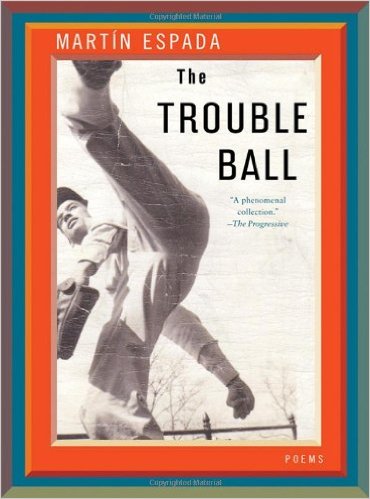
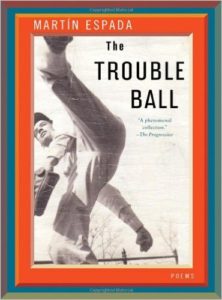 by Martin Esapda,
by Martin Esapda,
W.W. Norton & Company, 2011,
66 pages, paper, $15.95,
ISBN: 978-0-393-3456-4.
Buy the Book
Martin Espada is no longer a legal aid lawyer in Chelsea, MA, a job that provided him with at least one book, City of Coughing and Dead Radiators. He has moved to the safe quarters of academe, the University of Massachusetts, Amherst, located in what some call the “Happy Valley,” a term recognizing the Utopian initiatives in bucolic towns north of grittier Springfield and Holyoke. But Espada, whose style has always been more Springfield / Holyoke than Amherst, hasn’t gone soft. His latest poetry collection, The Trouble Ball, has plenty of his familiar punch. Some poems feel a bit ponderous in the effort to take on historical heft, but Espada retains his wise-guy sense of humor, an important tool for a writer of polemical poems, as he once observed in his essay collection, Zapata’s Disciple.
In “Blessed Be the Truth-Tellers,” he speaks of his mother warning him to “just walk away” if someone starts a fight.
Then somebody would smack
the back of my head
and dance around me in a circle, laughing. . . .
Bio notes in earlier Espada volumes have listed the variety of low-level jobs he held before obtaining a law degree. In “My Heart Kicked Like a Mouse in a Paper Bag” he recalls days on the cleaning crew at Sears:
I once removed the perfect turd from a urinal, fastidiously
as an Egytologist handling the scat of a pharaoh.
In the next to last poem of the volume, “Instructions on the Disposal of My Remains,” he says, “I want to be stuffed and mounted at the White Castle / in East Harlem.” This street-savvy
lighter touch entices readers to stay with him when he becomes more serious, as he does in “The Rowboat.”
The beggars cannot swim to the private islands of Lake
Cocibolca. Instead
they wander through the plaza in Granada, trailing after
the investors in paradise.
This is Nicaragua, where affluent tourists “climb the steps of the cathedral, to point cameras, to light candles for the dead / and ask forgiveness.” “The Swimming Pool at Villa Grimaldi” is set in Chile, where “blindfolded prisoners” are put in “cells too narrow to lie down” and taken to rooms “where electricity convulsed the body.” He writes of the “parking lot where interrogators rolled pickups /over the legs of subversives who would not talk.”
While such poems recall Witness poets like Juan Gelman or those in Carolyn Forche’s landmark volume, Against Forgetting, Espada knows that to be subversive means nothing more than expecting your apartment to be reasonably maintained (heat, hot water, no rodents) even if you only speak Spanish. This explains the irreverence he expresses towards one of poetry’s most iconic figures: “How to Read Ezra Pound” appears in part two of The Trouble Ball, appropriately titled “Blasphemy.” Espada quotes someone from a “poets panel” who recalls the Spanish Civil War:
If I knew
that a fascist
was a great poet,
I’d shoot him anyway. . . .
In “The Day We Buried You in The Park,” Espada and a co-conspirator inter the ashes of Alexander (“Sandy”) Taylor, co-founder of Curbstone Press, in an unnamed park, in violation of city law. The poem includes an epigraph from Whitman, an Espada favorite, whom he notably invoked in his earlier, much controversial, banned-by-NPR poem, “Another Nameless Prostitute Says The Man Is Innocent,” about Death Row Inmate Mumia Abu-Jamal: “If you want to see me again look for me under your bootsoles.”
Another act of civil disobedience occurs in my favorite poem from The Trouble Ball, “Isabel’s Corrido.” The 23 year old Espada enters into a marriage of immigration-convenience with a 19 year old Mexican, at the request of her sister. Isabel, his bride, has a boyfriend. It gets complicated. Eventually Isabel takes off on her own; later the sister calls to say that Isabel is dead from an apparent brain tumor. Espada recalls her headaches and no one calling a doctor: “We lived behind a broken door. We lived in a city hidden from the city.”
If Espada fans have any complaints about The Trouble Ball, it might be the title. This poet has given us “Rebellion is the Circle of A Lover’s Hands,” “For the Jim Crow Mexican Restaurant in Cambridge, Massachusetts, Where My Cousin Esteban Was Forbidden to Wait Tables Because He Wears Dreadlocks,” “A Mayan Astronomer in Hell’s Kitchen,” and my personal favorite, “Do Not Put Dead Monkeys in The Freezer.” The latter, both funny and chilling, recalls Espada’s job in a lab where the treatment of animals illustrates the human capacity for casual cruelty.
Regardless of titles, Espada assures us he will keep “walking through the world, soaking up the ghosts wherever I may go.” Concluding “Isabel’s Corrido,” he writes, “There was a conspiracy to commit a crime. This is my confession: I’d do it again.”
— Kevin Sweeney
Our Andromeda
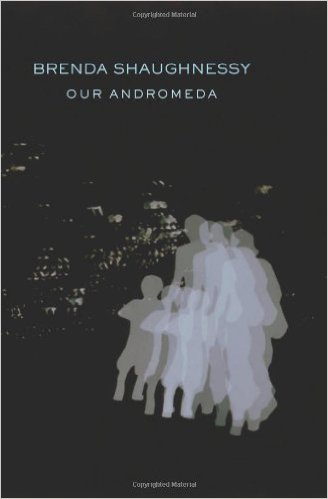
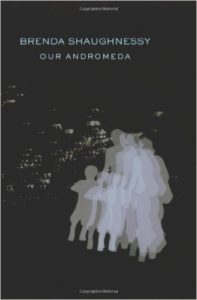 by Brenda Shaughnessy.
by Brenda Shaughnessy.
Copper Canyon Press, 2012,
$16, paper,
ISBN: 978-1-55659-410-6.
Buy the Book
We do artists few favors when we say, as a means of praise, that a work “hits home” — that some subject matter or other (oh subjectivity!) struck our sympathetic frequencies.
The ex-baseball player (for instance) whose favorite film is Field of Dreams, or the speedboat-owners toasting with Coronas before a Jimmy Buffett concert — how much do you trust their assessment of Kevin Costner’s emotional range or the lyrical depth of “A Pirate Looks at 40 ?”
They’ve seen a version of themselves, and they like what they see. And yet here I am under the spell of some poetic Propinquity Effect myself, wanting to tell you about weeping while I read Brenda Shaughnessy’s Our Andromeda aloud to my newborn daughter, as if a few tears might recommend a book.
How can you reconcile catastrophe and gratitude; burdens and blessings; terror and joy ? These are the concerns that sweat at the edges and burn at the heart of almost every poem in Our Andromeda.
Shaughnessy, whose son Cal suffered a brain injury during childbirth, uses Andromeda (both the book of her own making and the distant galaxy to which it refers) as a world of parallel projections. This is a world, as she wrote in a Poets & Writers essay, “in which my son was not injured at birth, a world in which he’d been allowed to live in his own body without the pain and restriction of cerebral palsy.”
A fantasy. A double-life. A different life, as she states in the title poem (which takes up roughly a fifth of the collection):
Wait till you see the doctors in Andromeda,
Cal. Yes, the doctors. It’s not the afterlife,
after all, but a different life.
The doctors are whole-organism empaths,
a little like Troi on The Next Generation
but with gifts in all areas of the sensate self.
Yes, 2012 seems to have been the year of refreshing sci-fi references in popular poetry. Tracy K. Smith’s Pulitzer Prize-winning Life on Mars got its lift from the space-stuff of Ziggy Stardust, Stanley Kubrick, and Edwin Hubble — searching the inner and outer dimensions for a mutable soul.
And in Shaughnessy’s Our Andromeda, where the fragile delivery of her son is described in terms of intergalactic travel, we get lines like this:
You came from Andromeda, Cal,
that other galaxy. Came to me, to us,
the moment you were born,
when the membrane between
worlds snapped and all that alien love
flooded my body. It came from you.
In her second collection, Human Dark with Sugar, Shaughnessy mixed the mythic with punk rock vim to decode moments of romantic longing. This time around, her desire is not zeroed-in on one specific absence, but aimed like buckshot at every future that would refuse her or her family, as in “Liquid Flesh”:
He howls with such fury and clarity
I must believe him.
No god has the power
to make me believe anything,
yet I happen to know
this baby knows a way out.
This dark hole closing in on me
all around: he’ll show me
how to get through
the shock and the godlessness
and the rictus of crushed flesh,
into the rest of my life.
And there is the hope, the stubborn motion forward. Shaughnessy is able to portray Cal not simply as an anchor for the book, but as the life at the center of her life, as the star feverishly pulsing in two galaxies at once:
Galaxies exploding everywhere
around us, exploding in us,
Cal, faster than the lightest light,
so much faster than love,
and our Andromeda, that dream,
I can feel it living in us like we
are its home. Like it remembers us
from its own childhood.
While the poet herself is suspicious of the intersection of “truth” and artifice (“Heart, what art you ?”she writes in “Artless”), I’m never far from feeling the off-the-page reality of these poems, in the most confessional of senses.
But why the tears ? Well, my girlfriend and I and our daughter had just gone through a highly traumatic birth experience, spent a couple weeks in the hospital, and come home to make our big adjustments. When I checked the mailbox on that first day back, Our Andromeda was waiting to be opened. All in one afternoon we read it to our daughter, and I cried, and cried, and cried.
Of course it would be crass as a reader and as a new father to say Our Andromeda “hits home.” My daughter recovered; Cal’s debilitation is permanent. And I hope that in making such contrasts and comparisons I’m not further condescending to Shaughnessy’s “sad new family struggling to find / blessings where blessings were.”
It’s just that in reading Our Andromeda, Brenda Shaughnessy’s defiant faith in love, all the more compelling for being hard-won, helped me better understand what it means to be a parent. Her poems help us see more clearly the ways in which love, if not the body, can be regenerative.
And “. . . if all possible / pain was only the grief of truth,” as Shaughnessy supposes in “All Possible Pain,” then solace must be possible in spite of that truth.
Or as she says in “Miracles:”
A light. Sailing a signal
flare behind me for another to find.
A scratch on the page
is a supernatural act, one twisting
fire out of water, blood out of stone.
We can read us. We are not alone.
Shaughnessy is the kind of poet for whom writing is not an act of mere relating, but of relation.
— Christopher Robley


